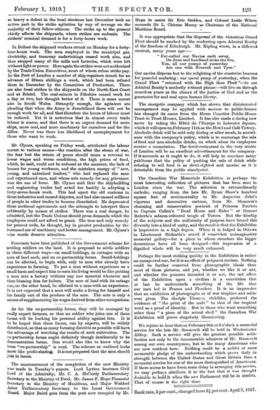Mr. Clynes, speaking on Friday week, attributed the labour unrest
to various causes—the reaction after the strain of war, the fear lest the return of peace should mean a reversal to lower wages and worse conditions, the high prices of food, which, he said, could not be reduced at the moment, the lack of houses for young workmen, and the mistaken energy of " new, young, and untrained leaders," who had replaced the sane and experienced men, and whose sole remedy for any grievance was the use of force. Mr. Clynes said that the shipbuilding and engineering trades had acted too heathy in adopting a forty-seven-hours week. This had upset the old customs in those industries and caused disputes, and had also caused millions of people in other trades to become dissatisfied. He deprecated these sectional agreements and the attempts to interpret them arbitrarily by means of strikes. There was a real danger, ho admitted, lest the Trade Unions should press demands which the employers could not afford to grant. The true and only remedy for present evils, he thought, lay in greater production by the increased use of machinery and better management. Mr. Clynes's wise words deserve attention.


































 Previous page
Previous page